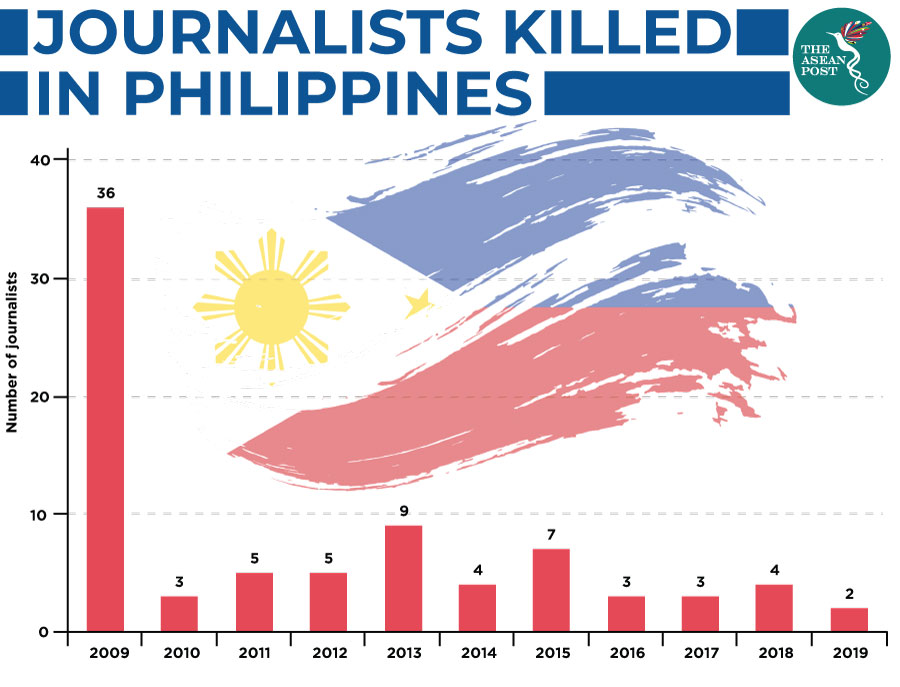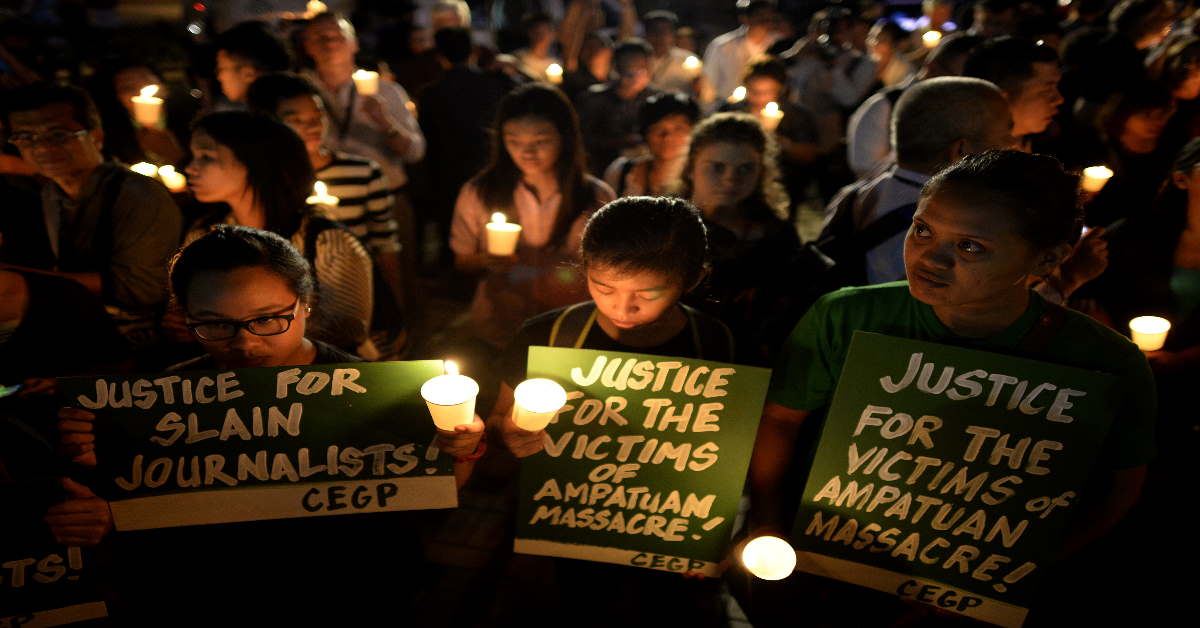Despite it being 10 years to the day, justice remains elusive for the victims of the Maguindanao massacre in the Philippines.
Exactly a decade ago, 58 people – including 32 journalists – were brutally gunned down in Ampatuan, a town in the Filipino province of Maguindanao, in what is still the single deadliest attack on journalists in the world.
The casualties were part of a convoy accompanying family members of Esmael ‘Toto’ Mangudadatu on their way to file his candidacy papers for the Maguindanao provincial elections in 2010 – making the massacre the worst case of election-related violence in Philippine history.

The 58 bodies were found in a mass grave covered with earth by an excavator and the incident quickly gained global notoriety – with United Nations (UN) Secretary General at the time, Ban Ki-moon calling it a “heinous crime.”
While President Gloria Macapagal Arroyo vowed that the perpetrators would be held accountable and “the law will hunt them until they are caught”, her promise must seem hollow to the victims’ families right now.
‘Dead men tell no tales’
Not only did the massacre focus international attention on the political clans which have long controlled parts of southern Philippines, it also shone a harsh spotlight on their private armies and the protection the clans have been allowed by the military and police.
Mangudadatu was set to go up against Andal Ampatuan Jr – the son of then Maguindanao provincial governor Andal Ampatuan Sr – in the elections. Of the 197 people accused in the case, 28 were from the Ampatuan clan.
Out of the 197 people accused, 117 were arrested, 90 were detained, 11 are out on bail and eight have died in detention during the duration of the 10-year trial. Although six people have had their cases dismissed and two have been discharged as state witnesses, the fact that 80 people are still at large is another bitter pill to swallow for those who have been calling for justice to be served.
With the judicial system accused of rampant corruption and witnesses becoming targets of assassination attempts, progress in the case has been understandably slow.
Calling the trial “a case study in intimidation and abuse”, Human Rights Watch (HRW) and other non-governmental organisations (NGOs) have documented multiple attempts to silence witnesses with cash and violence. Death threats are common, and at least four witnesses have been killed before they could testify – with the National Press Club noting in 2014 that “dead men tell no tales”.
Another reason justice has taken more than 10 years to be served is the fact that the 197 suspects were charged all at once – as opposed to prosecutors focusing on a certain number of key suspects before going after the rest.
While alleged mastermind Andal Ampatuan Sr died in 2015, Andal Ampatuan Jr and his brother Zaldy will remain in detention until the verdict is expected to be delivered on 20 December. However, another key suspect, Sajid Islam Ampatuan, was released on bail in 2015 and was twice elected mayor of a town in Maguindanao province.
Ampatuan Jr and Zaldy are among the 101 individuals who have been on trial for the last 10 years, with the court receiving the testimony of 357 witnesses and the case records now reaching 238 volumes – including transcripts and prosecution evidence.
All in all, it has been a mammoth case for prosecutors to tackle, although they have been aided by certain groups which have been actively keeping the case in the limelight.
‘10 years with no justice’
Calling on the public to protect the basic tenets of democracy, the National Union of Journalists of the Philippines (NUJP) issued a statement yesterday urging the Filipino public to stand against “the dark claws of injustice and impunity.”
“10 years have passed yet no verdict has been meted on the perpetrators. Despite the imprisonment of some members of the Ampatuan clan, power still prevails in the towns of Maguindanao,” said the NUJP (Davao City Chapter) in a statement.
“10 years with no justice and the culture of impunity worsens in the Philippines… Press freedom and human rights have never taken such a beating and taken new meaning as the "threat" to the current administration in the country.”
Although the current administration led by President Rodrigo Duterte has no qualms about lashing out at his critics, the rhetoric the Filipino leader has dished out at journalists has been especially vile.
Calling them “spies,” “vultures” and “lowlifes”, Duterte probably summed up his contempt for media practitioners the best in 2016 when he declared that “just because you’re a journalist, you are not exempted from assassination if you’re a son of a b***h.”
While this statement may or may not have been said in jest, it certainly adds to the culture of impunity which surrounds the extrajudicial killings which have been a characteristic of Duterte’s presidency.
Speaking to Filipino media outlet Rappler yesterday, NUJP chair Nonoy Espina said that an acquittal next month will send a signal that the next elections “are gonna be bloody.”
“I can imagine the implications of that (acquittal) on the electoral process,” he said.
“And that’s more than press freedom, that’s the lynchpin of our democratic system – free elections. So, if you say, no, they weren’t guilty of the massacre, then, my God, I can’t imagine what future elections will look like.”
Related articles:
Journalist murders unpunished in the Philippines
